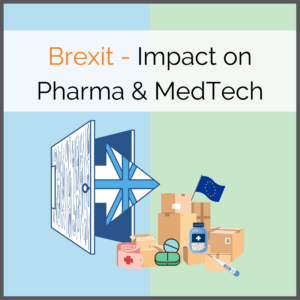
It has taken four years for the British to finally leave after their referendum against remaining in the European Union. Despite the last-minute trade deal, the impact of Brexit on the Pharma and Medtech industries is huge, and they are left with only a little concrete information.
In 2016, just over half of the Britons voted for the UK to leave the EU. The pharma and MedTech industries have faced a big question mark ever since. It was not clear for a long time whether there would be an agreement and how this would affect the highly regulated industries. After countless debates and postponements in the past years, the EU and the UK agreed on a trade agreement of around 1400 pages before the turn of the year, on Christmas Eve. The transition period finally ended on 31.12.2020.
Overview:
- 23.06.2016: Referendum day in the UK. 52% of Britons vote to leave the EU.
- 31.01.2020: Great Britain leaves the EU for good, a one-year transition period is agreed upon
- 24.12.2020: EU and Great Britain agree on a trade agreement, which comes into force on 01.01.2021
- 31.12.2020: The transition period ends, and the trade agreement comes into force
Brexit impact on the Pharmaceutical Industry: New rules
As for all other goods, the open border with Northern Ireland does not make the discussions easier. The following guidelines apply to England, Scotland, Wales, the Isle of Man, and the Channel Islands:
What remains?
- Single Market Packs (SMPs) that entered the UK market before the end of the transition period will remain in the market and are still to be sold.
- MAHs/OBPs from the UK will remain linked to the EU hub and will not be excluded as previously feared. The link remains in place to allow medicines exported from the UK to the EU to continue to be serialized and reported to EMVO following the EU FMD.
What will fall apart?
- SMPs to be exported to the UK will no longer have to be serialized and reported to the EU hub. Should they still be reported to the EU hub, they must be marked as “exported”.
Exporting to the UK
- All medicines are subject to the general conditions and agreements for commercial goods.
- Medicines to be imported into the UK from the EU must be certified by a Qualified Person (QP) and inspected by a Responsible Person (RP).
- Existing Wholesaler Authorisation Agreements remain in place.
Special case Northern Ireland
- The SecurMed system in Great Britain has been inactive since the beginning of 2021. For Northern Ireland, it remains active as UKNI MVS (no longer UK MVS).
In principle, there are no explicit provisions in the trade agreement for topics such as pharma serialization and the corresponding regulatory requirements. Therefore, EMVO has compiled some concrete instructions for action in this regard. Nevertheless, more detailed agreements and regulations will come in the future. Besides, Great Britain has announced that it is striving for its regulations concerning pharmaceutical serialization and protection against counterfeit medicines. However, it is not yet clear when and to what extent this will happen.
Brexit impact on the medical technology industry?
For the medical technology industry and the implementation of the MDR, Brexit means a step backward. UK Notified Bodies will loose their competence and their certification. Therefore, they will no longer be available to European medical technology manufacturers for the far-reaching recertification for the MDR.
Medical devices are not included in the agreement between the EU and the UK. They are part of the general regulations that affect all CE-marked products. For CE products from the EU, this means that they will continue to be accepted in the UK (until 30 June 2023). From 01.01.2021, CE marking in GB will be replaced by the UKCA system. For two years, both systems will run in parallel. Both standards must be met for imports from the UK into the EU as only CE-marked products will be recognized in the EU.
To continue selling medical devices from the EU on the UK market, they need an RP. In this case, the same rules apply to pharmaceutical manufacturers. Conversely, manufacturers from the UK must appoint an EU Authorised Representative.
The trade agreement between the EU and the UK leaves many questions unanswered. It remains to be seen what new regulations the UK will draft for topics, such as serialization or patient safety for medical devices, and whether and how much additional effort this will cause for manufacturers.
[Update on pharmaceutical exports to Northern Ireland]
From January 01, 2025, the EU FMD will no longer apply to Northern Ireland, and Regulation (EU) 2023/1182 will come into force. As in the UK, medicinal products for human use exported from Europe to Northern Ireland will now require marketing authorization from the UK authorities. They may not be part of a multi-pack for other European markets and need to be labeled “UK only”. The same requirements apply to the parallel distribution of medicines. The connection to the EU HUB continues to exist. However, serialization is now voluntary and no serial number data needs to be exchanged with the EU HUB.
[Disclaimer]This information is only one possible interpretation of the regulations. They are also in a constant state of change, so the information in this article may be incomplete or out of date. The above article is expressly no legal advice. Please refer to the official documents for information before making any business decisions. (Status of information: February 2024)